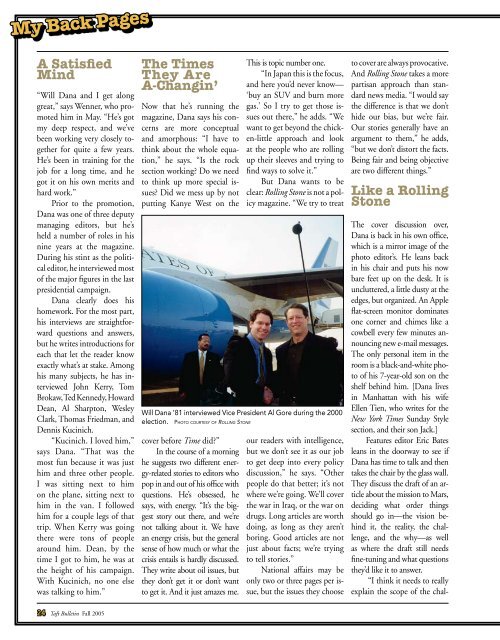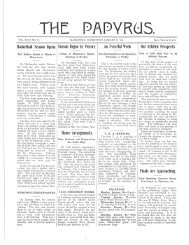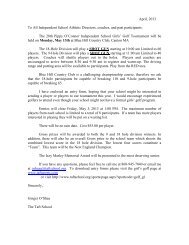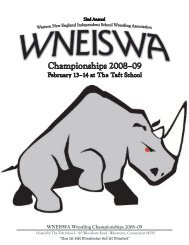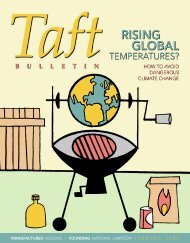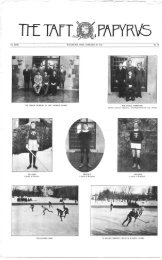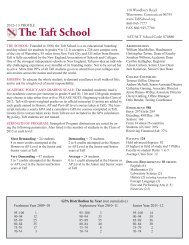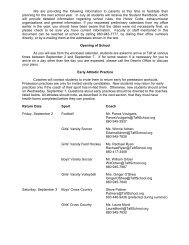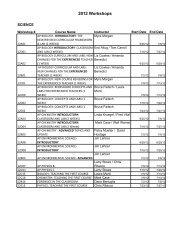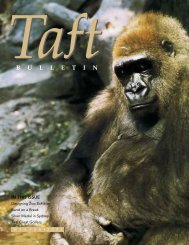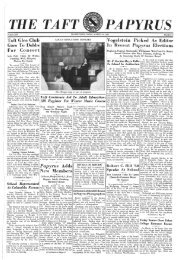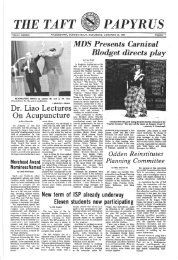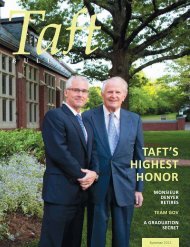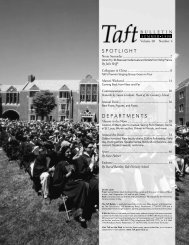You also want an ePaper? Increase the reach of your titles
YUMPU automatically turns print PDFs into web optimized ePapers that Google loves.
My Back Pages<br />
A Satisfied<br />
Mind<br />
“Will Dana <strong>and</strong> I get along<br />
great,” says Wenner, who promoted<br />
him in May. “He’s got<br />
my deep respect, <strong>and</strong> we’ve<br />
been working very closely toge<strong>the</strong>r<br />
for quite a few years.<br />
He’s been in training for <strong>the</strong><br />
job for a long time, <strong>and</strong> he<br />
got it on his own merits <strong>and</strong><br />
hard work.”<br />
Prior to <strong>the</strong> promotion,<br />
Dana was one of three deputy<br />
managing editors, but he’s<br />
held a number of roles in his<br />
nine years at <strong>the</strong> magazine.<br />
During his stint as <strong>the</strong> political<br />
editor, he interviewed most<br />
of <strong>the</strong> major figures in <strong>the</strong> last<br />
presidential campaign.<br />
Dana clearly does his<br />
homework. For <strong>the</strong> most part,<br />
his interviews are straightforward<br />
questions <strong>and</strong> answers,<br />
but he writes introductions for<br />
each that let <strong>the</strong> reader know<br />
exactly what’s at stake. Among<br />
his many subjects, he has interviewed<br />
John Kerry, Tom<br />
Brokaw, Ted Kennedy, Howard<br />
Dean, Al Sharpton, Wesley<br />
Clark, Thomas Friedman, <strong>and</strong><br />
Dennis Kucinich.<br />
“Kucinich. I loved him,”<br />
says Dana. “That was <strong>the</strong><br />
most fun because it was just<br />
him <strong>and</strong> three o<strong>the</strong>r people.<br />
I was sitting next to him<br />
on <strong>the</strong> plane, sitting next to<br />
him in <strong>the</strong> van. I followed<br />
him for a couple legs of that<br />
trip. When Kerry was going<br />
<strong>the</strong>re were tons of people<br />
around him. Dean, by <strong>the</strong><br />
time I got to him, he was at<br />
<strong>the</strong> height of his campaign.<br />
With Kucinich, no one else<br />
was talking to him.”<br />
<strong>The</strong> Times<br />
<strong>The</strong>y Are<br />
A-Changin’<br />
Now that he’s running <strong>the</strong><br />
magazine, Dana says his concerns<br />
are more conceptual<br />
<strong>and</strong> amorphous: “I have to<br />
think about <strong>the</strong> whole equation,”<br />
he says. “Is <strong>the</strong> rock<br />
section working? Do we need<br />
to think up more special issues?<br />
Did we mess up by not<br />
putting Kanye West on <strong>the</strong><br />
cover before Time did?”<br />
In <strong>the</strong> course of a morning<br />
he suggests two different energy-related<br />
stories to editors who<br />
pop in <strong>and</strong> out of his office with<br />
questions. He’s obsessed, he<br />
says, with energy. “It’s <strong>the</strong> biggest<br />
story out <strong>the</strong>re, <strong>and</strong> we’re<br />
not talking about it. We have<br />
an energy crisis, but <strong>the</strong> general<br />
sense of how much or what <strong>the</strong><br />
crisis entails is hardly discussed.<br />
<strong>The</strong>y write about oil issues, but<br />
<strong>the</strong>y don’t get it or don’t want<br />
to get it. And it just amazes me.<br />
This is topic number one.<br />
“In Japan this is <strong>the</strong> focus,<br />
<strong>and</strong> here you’d never know—<br />
‘buy an SUV <strong>and</strong> burn more<br />
gas.’ So I try to get those issues<br />
out <strong>the</strong>re,” he adds. “We<br />
want to get beyond <strong>the</strong> chicken-little<br />
approach <strong>and</strong> look<br />
at <strong>the</strong> people who are rolling<br />
up <strong>the</strong>ir sleeves <strong>and</strong> trying to<br />
find ways to solve it.”<br />
But Dana wants to be<br />
clear: Rolling Stone is not a policy<br />
magazine. “We try to treat<br />
Will Dana ’81 interviewed Vice President Al Gore during <strong>the</strong> 2000<br />
election. Photo courtesy of Rolling Stone<br />
our readers with intelligence,<br />
but we don’t see it as our job<br />
to get deep into every policy<br />
discussion,” he says. “O<strong>the</strong>r<br />
people do that better; it’s not<br />
where we’re going. We’ll cover<br />
<strong>the</strong> war in Iraq, or <strong>the</strong> war on<br />
drugs. Long articles are worth<br />
doing, as long as <strong>the</strong>y aren’t<br />
boring. Good articles are not<br />
just about facts; we’re trying<br />
to tell stories.”<br />
National affairs may be<br />
only two or three pages per issue,<br />
but <strong>the</strong> issues <strong>the</strong>y choose<br />
to cover are always provocative.<br />
And Rolling Stone takes a more<br />
partisan approach than st<strong>and</strong>ard<br />
news media. “I would say<br />
<strong>the</strong> difference is that we don’t<br />
hide our bias, but we’re fair.<br />
Our stories generally have an<br />
argument to <strong>the</strong>m,” he adds,<br />
“but we don’t distort <strong>the</strong> facts.<br />
Being fair <strong>and</strong> being objective<br />
are two different things.”<br />
Like a Rolling<br />
Stone<br />
<strong>The</strong> cover discussion over,<br />
Dana is back in his own office,<br />
which is a mirror image of <strong>the</strong><br />
photo editor’s. He leans back<br />
in his chair <strong>and</strong> puts his now<br />
bare feet up on <strong>the</strong> desk. It is<br />
uncluttered, a little dusty at <strong>the</strong><br />
edges, but organized. An Apple<br />
flat-screen monitor dominates<br />
one corner <strong>and</strong> chimes like a<br />
cowbell every few minutes announcing<br />
new e-mail messages.<br />
<strong>The</strong> only personal item in <strong>the</strong><br />
room is a black-<strong>and</strong>-white photo<br />
of his 7-year-old son on <strong>the</strong><br />
shelf behind him. [Dana lives<br />
in Manhattan with his wife<br />
Ellen Tien, who writes for <strong>the</strong><br />
New York Times Sunday Style<br />
section, <strong>and</strong> <strong>the</strong>ir son Jack.]<br />
Features editor Eric Bates<br />
leans in <strong>the</strong> doorway to see if<br />
Dana has time to talk <strong>and</strong> <strong>the</strong>n<br />
takes <strong>the</strong> chair by <strong>the</strong> glass wall.<br />
<strong>The</strong>y discuss <strong>the</strong> draft of an article<br />
about <strong>the</strong> mission to Mars,<br />
deciding what order things<br />
should go in—<strong>the</strong> vision behind<br />
it, <strong>the</strong> reality, <strong>the</strong> challenge,<br />
<strong>and</strong> <strong>the</strong> why—as well<br />
as where <strong>the</strong> draft still needs<br />
fine-tuning <strong>and</strong> what questions<br />
<strong>the</strong>y’d like it to answer.<br />
“I think it needs to really<br />
explain <strong>the</strong> scope of <strong>the</strong> chal-<br />
24 <strong>Taft</strong> Bulletin Fall 2005


